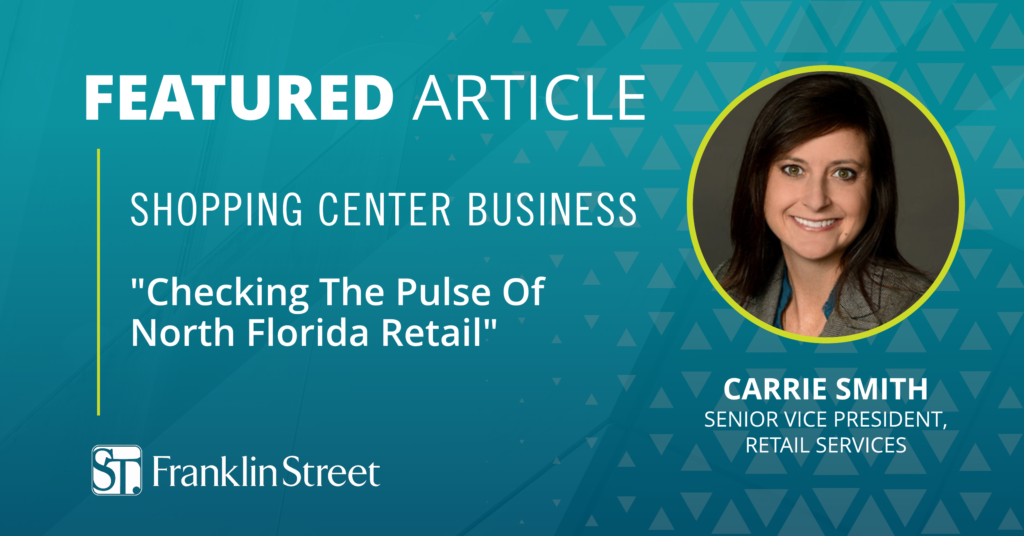Franklin Street’s Carrie Smith, Senior Vice President of Retail Services, was recently interviewed by Shopping Center Business on the state of the North Florida retail market. Below are excerpts from her interview:
As we move into 2022, Shopping Center Business checked in with retail experts in North Florida, focusing on Gainesville, Jacksonville and the Panhandle markets, to gain an understanding of the current health of the region, as well as continued trends and changes on the horizon.
The following Q&A features expertise and insight about the various North Florida markets from Megan Atkin, founder and CEO of Jacksonville-based Entwine Real Estate; Ralph Conti, principal of Atlanta-based RaCo Real Estate; Carrie Smith, senior vice president of retail leasing with Tampa-based Franklin Street; and Patrick McKinley, vice president and market officer at Jacksonville-based REIT Regency Centers.
Shopping Center Business: What is the current health of the North Florida retail market?
Carrie Smith: The retail markets from Jacksonville to north-central Florida and to the Panhandle are very healthy. There’s currently a strong appetite by existing retailers to expand in these markets and a significant number of new-to-market retailers looking to open in the region. In nearly all the major metros throughout North Florida, there is still not enough supply to meet demand, with new projects being slow to deliver due to labor shortages, supply chain issues and in some areas, the municipalities greatly delaying permitting processes. All of this equates to retailers and restaurants competing for space, which translates into higher rental rates and stronger terms for owners. According to Franklin Street market research, retail rents in North Florida have increased significantly the last 12 months. In Jacksonville, rents increased by 7.1 percent in fourth-quarter 2021, ending the quarter and year at $20.26 per square foot. We predicted this level of rent growth at the onset of 2021, but executed leases prove this trend.
SCB: Are there any significant changes in retailer, tenant and/or consumer behavior between the onset of the pandemic and now? How are properties adjusting to those changes?
Smith: For one, the name of the game for restaurants these days is convenience. Consumers greatly prefer the drive-thru over indoor dining, with several chains reporting 80 percent or more sales in the drive-thru, compared to 65 percent pre-pandemic. In addition, we see fast-casual concepts embracing the drive-thru like never before. And while we saw this trend creeping up pre-pandemic, we now see a permanent change and adjustment in consumer behavior. Secondly, several retailers in the soft goods, grocery and big-box categories have not only embraced a more seamless omnichannel experience for the consumers, but this has forever changed the way consumers shop in stores. From toilet paper, contact solution or sneakers for your kids to ingredients for dinner or forgotten items for a home improvement project — Target, Publix and Lowe’s Home Improvement, to name a few retailers, offer same-day pick up or delivery. While we saw convenience and online ordering before the pandemic, the consumer has now come to expect a myriad of ways to shop, pick up or have items delivered.





